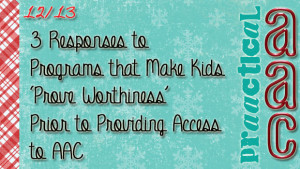March 26, 2014
by Carole Zangari -

For many users of AAC, the road to communicative competence is an arduous one. Consider the case of JJ, a bright 4 year old with severe motor limitations, who enters a typical preschool with only a few intelligible words. After months of meetings, on the first day of school, his proud parents carry him into the classroom. They fasten him into an adapted chair that they brought for him to sit in and spend a half hour giving his aide instructions about his likes and dislikes, feeding difficulties, and toileting needs. Meanwhile, his teacher introduces him to some classmates, who are amazed, curious, and a little frightened of his unusual chair, constant drooling, grunting sounds, and random, jerky movements. One brave soul offers the child a toy, but JJ’s unruly arms bat it away and won’t let him take it. His would-be friend steps back, a bit confused. As they... [Read More...]
Filed under: PrAACtical Thinking
Tagged With: prerequisites
December 13, 2013
by Carole Zangari -

Like many of you, we continue to hear about programs that withhold AAC supports from children who are nonverbal or minimally verbal. Sometimes they point to the perceived lack of readiness that the child has for AAC, in general. Other times, they erect barriers, such as an artificial benchmark that insists that children start with no-tech AAC (e.g., communication boards, books, PECS) or low tech SGDs before ‘earning the right’ to sophisticated AAC options. As yet another year comes to a close, it is hard to believe that there are still programs, administrators, or, worse yet, our SLP colleagues who think they are truly justified in limiting access to AAC. How can we move beyond tearing our hair out, drinking excessively, or ranting to our friends? Here are some ideas. “Show me the evidence.” Ask for empirical support for the position that withholding access to AAC tools and strategies is more... [Read More...]
Filed under: PrAACtical Thinking
Tagged With: barrier, participation model, prerequisites, rationale

